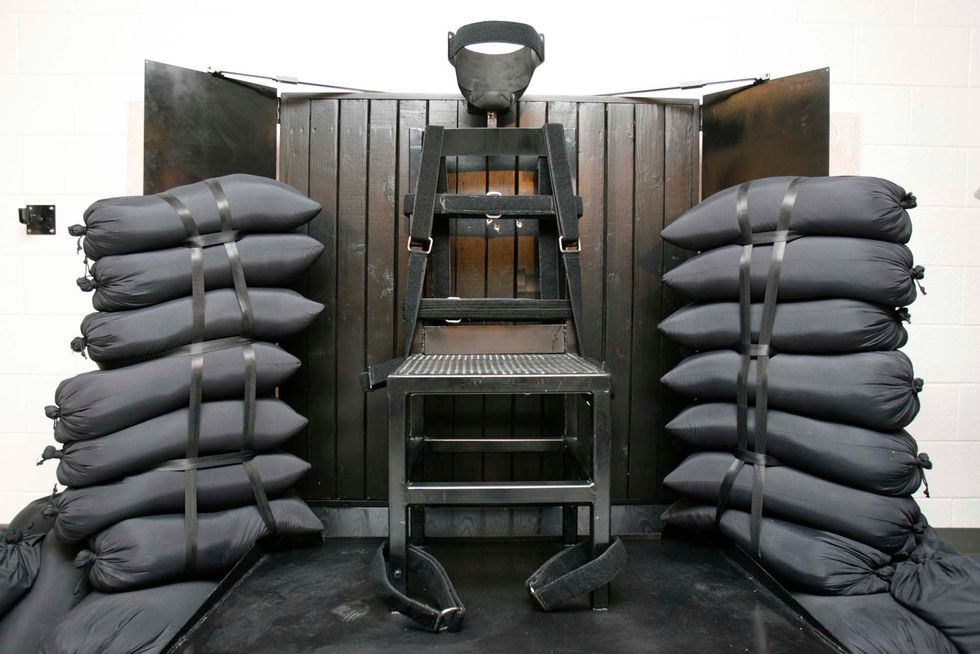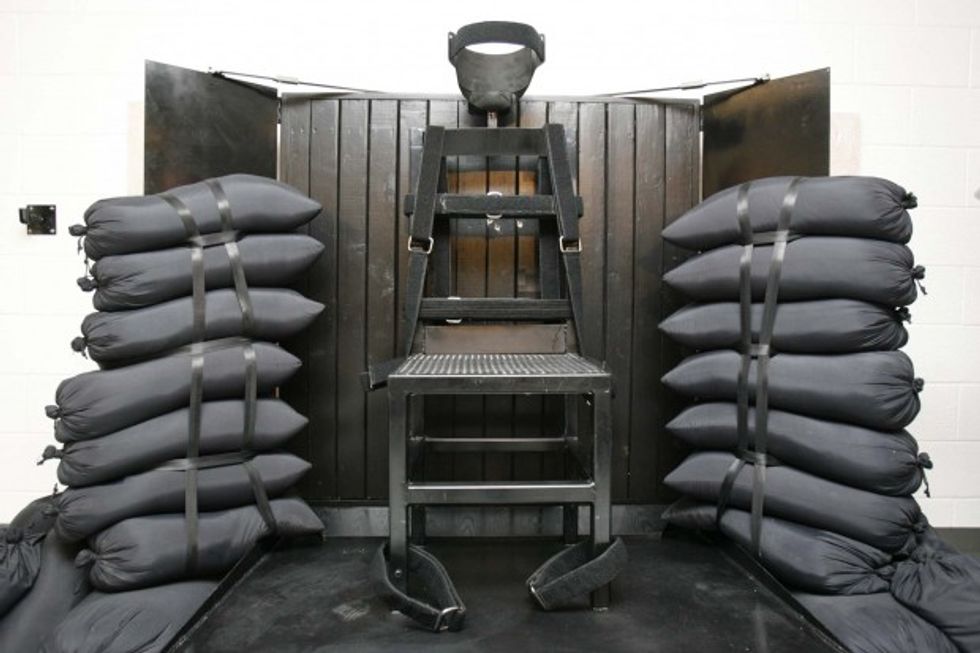
FILE - This June 18, 2010, file photo shows the firing squad execution chamber at the Utah State Prison in Draper, Utah. (AP Photo/Trent Nelson, Pool, File)

As Mary Ramirez pointed out recently, there was strong opposition to the Boston Marathon Bomber, Dzhokhar Tsarnaev, receiving a death sentence.
Two-thirds of Boston residents opposed the death penalty for Tsarnaev. So did the Catholic Church, saying that “society can do better than the death penalty.” Several family members of victims killed in the attack also urged a life without parole sentence, so as to avoid the prolonged and often painful legal process of capital cases.
I was in Boston and had finished the marathon before the bombs went off. I certainly can understand Ramirez’s reaction to the verdict on Twitter – “Fry the little devil.” What Tsarnaev did was cruel, horrific, and caused tremendous pain to Boston and the country. Still, his actions didn’t change my mind on the death penalty.
I respect Ramirez for stepping back from her gut reaction and looking more closely at the death penalty. There are reasons, though, to question her conclusions.

The biblical evidence that Ramirez offers in support of the death penalty is less straightforward than she implies. Ramirez is right that the commandment “Thou shalt not kill” (Exodus 20:13) forbids murder and should not be interpreted as a prohibition on capital punishment. Such a prohibition would be out of place in the Old Testament, which authorizes the death penalty elsewhere (e.g., Leviticus 20).
But other passages cast doubt on the claim that we should read the Old Testament as mandating capital punishment. Notably, God spares the life of the first person to commit murder, Cain, as well others guilty of grave crimes, such as David.
When turning to the New Testament, Ramirez cites Romans 13:4, a favorite verse of death penalty proponents. It is unlikely, however, that Paul here even has capital punishment in mind. When Paul notes that the government “does not bear the sword in vain,” his mention of the sword likely references government’s general authority to use force rather than the death penalty specifically – an important distinction. For instance, there is nothing incompatible with believing today that government has the authority to wield the gun while at the same time opposing the death penalty.
So Romans 13 is far from a slam-dunk in support of capital punishment, and other passages are even less favorable. Speaking of the same Roman Empire that Paul lived under, John of Revelation condemns it as illegitimate, specifically criticizing its killing of Christians (e.g., Revelation 17:6). In this context, unsurprisingly many early Christians were critical of capital punishment.
Perhaps most importantly for Christians, Jesus refuses to speak in favor of an execution but instead stops it for the woman caught in adultery (John 8:1-11). Interestingly, in a poll asking whether Jesus would support government exercising the death penalty, only 5 percent of Americans said he would. If we don’t think that Jesus would support the death penalty, that should give Christians pause in championing it.
Ramirez’s justification of the death penalty as self defense is problematic, since capital punishment, by definition, involves killing those already rendered defenseless.
If a death row inmate somehow escapes before an execution and attacks a guard who must use lethal force to stop this threat, that is self defense. But it is not an instance of capital punishment, which only occurs if government succeeds in rendering the inmate defenseless and then killing him.

Ramirez could argue that some people are so dangerous that the only way to ensure society’s future safety is executing them. The current system of capital punishment, though, undermines this point. No one sentenced to death is executed right away. A long trial and series of appeals – often lasting decades – must be completed before an execution ever takes place. Corrections officers have measures in place to keep those on death row from harming others until their execution date or, what is more likely, their natural death in prison (most death sentences are overturned).
Furthermore, the data fails to show that the death penalty effectively deters crime. States without the death penalty have lower murder rates than states with it, and most police chiefs and criminologists find the death penalty to be an ineffective deterrent. Given the resource-intensive nature of capital cases, the death penalty arguably hurts public safety by diverting resources away from measures that reduce crime. Study after study shows that the death penalty costs state and local governments millions of dollars more than life in prison without parole.
Could we spend less time and money on capital cases by executing people faster? The courts have said no, due to the irrevocable nature of the death penalty and many mistakes in capital cases, which leads to the third problem in Ramirez’s argument.
Ramirez defends a death penalty that functions well and is always applied to the bad guys. To evaluate a policy, we have to look at how it functions in the real world, where imperfect people carry it out. If the past is any guide, America’s track record with capital punishment offers little to inspire confidence.
Since 1973, over 150 individuals in the U.S. have been wrongfully sentenced to death and later exonerated. A recent study estimates that 4 percent of individuals sentenced to death are innocent. There are admitted instances of innocent people being executed, and such irreversible mistakes likely have occurred in the recent past.
Digging into the details of capital cases reveals no shortage of spectacular mistakes and abuse by government:
I could go on. These cases show only part of the problem, since many cases lack available DNA or other testable evidence and leave little recourse to the wrongfully convicted to prove their innocence. It is at great risk to innocent lives, then, that we justify the death penalty by holding onto the vain hope that the errors and abuse marring capital cases will suddenly stop.
With Tsarnaev in prison, we do not need to execute him to be safe. Furthermore, if we keep the death penalty for cases like his, we necessarily keep in place a system that also threatens innocent life at an alarmingly high rate. Recognizing this reality, many Christians find it impossible to justify capital punishment any longer and are helping to end it, as is evident by recent developments in Nebraska.
Ben Jones is a campaign strategist for Equal Justice USA (EJUSA) and works in support of Conservatives Concerned about the Death Penalty, a project of EJUSA.
–
TheBlaze contributor channel supports an open discourse on a range of views. The opinions expressed in this channel are solely those of each individual author.